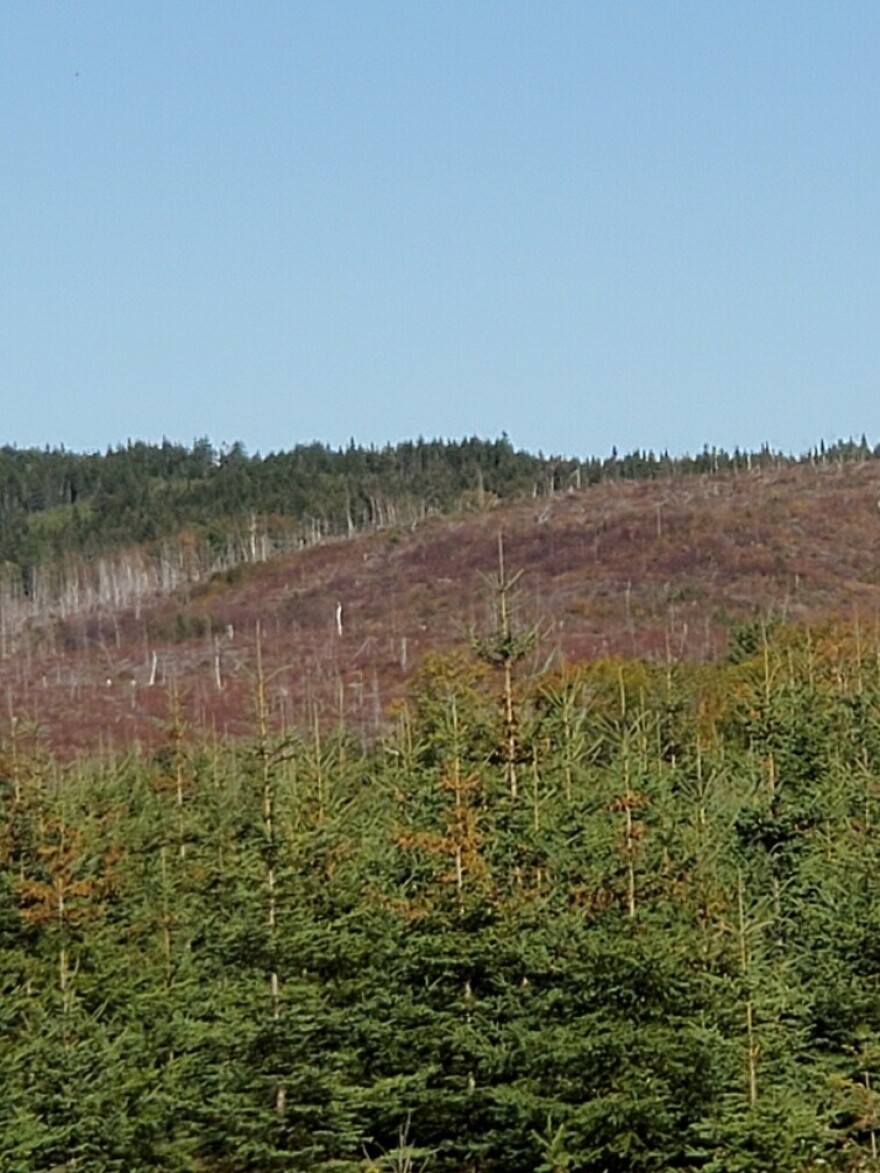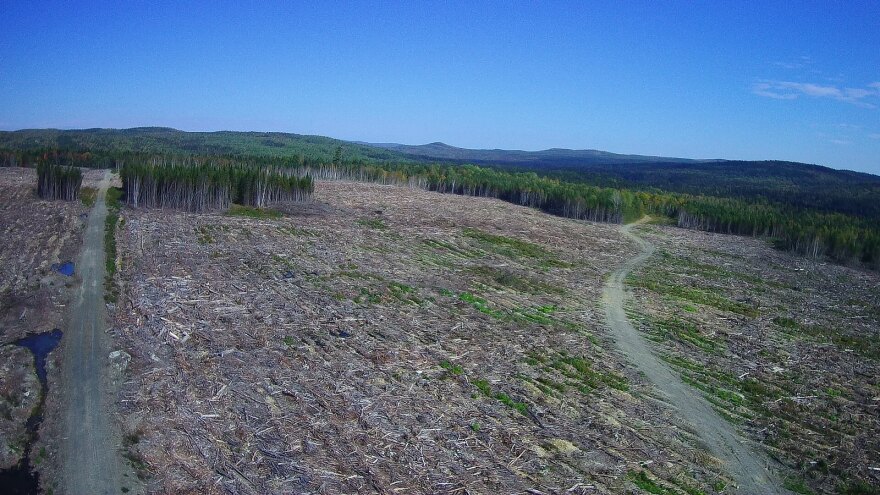Around the country, concerns are being raised in television ads about the use of one of the most widely-used herbicides: "If you or someone you know has been diagnosed with non-Hodgkin's lymphoma after being exposed to Roundup or a glyphosate herbicide, call now."
Glyphosate comes in many forms and is sold in an array of lawn and garden products, in agriculture and in forestry applications, but it's been deemed a "probable carcinogen" by the World Health Organization. In Maine, the aerial spraying of glyphosate to manage timber is currently under scrutiny, and Maine lawmakers are considering whether to ban the practice.

In timber management, herbicides are used to control vegetation that may compete with species like spruce and fir — species that are more desirable for use in the forest products industry. And even though less than four percent of the acres harvested in Maine are treated with herbicides — fewer than 15,000 acres per year — for some residents of Aroostook County, that’s still too many.
"They're spraying Portage Lake, Madawaska, Grand Isle, Masardis, Dudley, St. Croix, Smyrna, Stockholm..." Caribou resident Patty Blackstone reads a public notice in the newspaper advising Aroostook County communities about aerial herbicide spraying by the Canadian conglomerate J.D. Irving over the summer.
With more than 1.2 million acres, Irving is one of Maine's largest landowners. And Blackstone and many others are worried about the health and environmental effects of herbicide spraying, which is sometimes used after a clear cut. That's a practice in which all the trees are cut down from an area which can then be replanted with conifers.
"We're heading, if the gate is not closed, to see some clearcuts that are sprayed with herbicide," says Hilton Hafford.

Hafford is a resident of Allagash, population 230, which passed an ordinance that banned the use of herbicides for forestry purposes in town limits back in 2004. Hafford is a former logger who grew up hunting and fishing in the sprawling forestlands that surround Allagash, which is more like an outpost than a town. He knows all the logging roads and gates by heart. And for the last few years, he has been speaking out about the use of glyphosate and other herbicides because of his concern for people and wildlife.
drone footage from Hilton Hafford
"There is no animal that can survive without green leaf vegetation in the woods,” he says. “They can't exist on fir trees or spruce trees."
Hafford stops along a road a few miles out of town to point out a clear cut that has since been replanted.
"This is now a tree plantation and, except for the side of the road, there's nothing for them to eat and they don't eat the spruce trees."
In the wintertime, Hafford says he and several other residents feed more than 100 deer who otherwise might starve. Anecdotally, he says, he's not seeing as many deer, moose or bear near town. According to a spokesperson for Maine's Inland Fisheries and Wildlife Department, the deer population in northern Maine is low, but the moose population is stable, and the bear population is increasing.

Patrick Strauch of the Maine Forest Products Council says some studies show that the effects of herbicides on animals like moose are negligible.
"Some of the wildlife studies have shown the moose may exit one year, but they'll be back in years one or two, and they'll have vegetation that's within reach," he says.
According to the National Pesticide Information Center, glyphosate is low in toxicity to fish and wildlife, but some products that contain it may be toxic because of other ingredients in them. And, the center says, glyphosate may affect fish and wildlife indirectly by altering their habitat.
But Strauch says herbicide spraying is an important tool for forest landowners, and that it is used strategically.
"We know spruce and fir are going to be really important dimension lumber species, so we can't write them off,” he says. “We have to figure out how to grow them and we need all the tools to grow them well."
"I just wanted to certainly thank the Committee for taking the time to come all the way up here. I know it's a long drive on a Tuesday,” said Democratic Maine Sen. President Troy Jackson at a public forum in Fort Kent earlier this week.
At the forum, members of the Legislature's Agriculture, Conservation and Forestry Committee listened to supporters and opponents of a bill to ban the aerial spraying of herbicides by the forest industry. The bill, sponsored by Jackson, received support from Maine lawmakers in the last session but was held by the governor. Committee members are now using the next few months to gather more information on the issue.
"We should consider ourselves fortunate to have this industry, and we want to be doing everything in our power to continue to invest in the future. And glyphosate is just a critical component of that," says Zachary Lowry, a forester from Mapleton.
Lowry works for the Seven Islands Land Company. He calls glyphosate a "miracle" chemical and says that if aerial applications were banned it wouldn't be possible for landowners to use ground spray. It would be too inefficient, he says, on a scale as large as the North Woods.
Foresters also point out that large landowners such as J.D. Irving undergo third-party audits of their forest practices in order to be certified as sustainable. But in Aroostook County, residents like Coleen McBriety of Allagash remain skeptical.
"If they're telling you that that spray does not get in the water, that is not true,” McBriety says. “It gets in the water. It gets in the air that we breathe, gets in the animals that we eat. So please put this bill forward and ban aerial spraying."
Several countries have banned the use of glyphosate. Others have restricted its use. Maine lawmakers are expected to reconsider a ban on aerial spraying when they reconvene in January.
Originally published 5:34 p.m. Sept. 27, 2019





